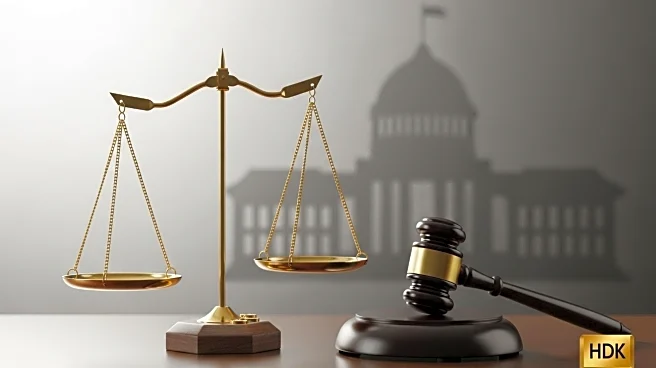What's Happening?
Former FBI Director James Comey has been indicted by the Justice Department, accused of falsely testifying to Congress in 2020 about authorizing someone to be an anonymous source in news stories. The indictment, which is only two pages long, alleges that Comey lied during his testimony before the Senate Judiciary Committee, specifically in an interaction with Senator Ted Cruz. The case revolves around Comey's denials of leaking or authorizing leaks related to investigations into Russia's involvement in the 2016 presidential campaign and Hillary Clinton's use of a private email server. The indictment is based on statements from Comey's former deputy, Andrew McCabe, who claimed that Comey approved of information being passed to The Wall Street Journal for an article. Legal experts suggest that the case against Comey may be difficult to prove due to the lack of detailed evidence in the indictment.
Why It's Important?
The indictment of James Comey is significant as it highlights ongoing tensions and legal battles stemming from investigations into the 2016 presidential election and the conduct of high-ranking officials. The case underscores the contentious relationship between President Trump and Comey, with Trump publicly calling for Comey's indictment. The outcome of this case could have implications for the credibility and reputation of the Justice Department, as well as for the individuals involved. A conviction could impact Comey's legacy and influence public perception of the FBI's handling of politically sensitive investigations. Additionally, the case may set a precedent for how allegations of misconduct by government officials are addressed in the future.
What's Next?
The legal proceedings against Comey are expected to continue, with potential challenges in proving the allegations due to the sparse details in the indictment. The case may face scrutiny regarding the motivations behind the charges, especially given the political context and Trump's public statements. If the case goes to trial, it could involve testimony from key figures such as Andrew McCabe, whose credibility may be questioned. The Justice Department may seek additional evidence to strengthen the case, and there is speculation about the possibility of a superseding indictment. The outcome of the trial could influence future investigations and prosecutions related to government transparency and accountability.
Beyond the Headlines
The indictment raises questions about the ethical and legal responsibilities of government officials in handling sensitive information and their interactions with the media. It also highlights the challenges in balancing transparency with national security concerns. The case may prompt discussions about the role of political influence in legal proceedings and the importance of maintaining impartiality in the justice system. Furthermore, it could lead to broader debates about the impact of leaks and the media's role in shaping public perception of government actions.










